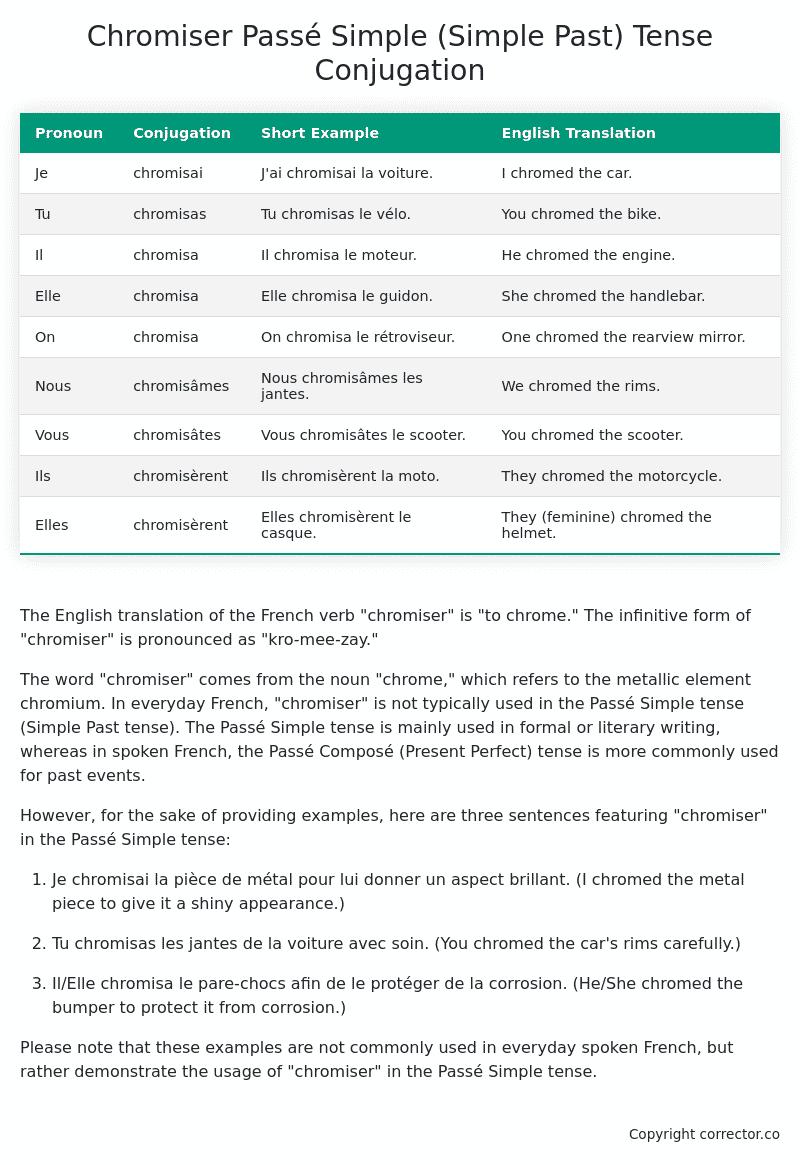Passé Simple (Simple Past) Tense Conjugation of the French Verb chromiser
Introduction to the verb chromiser
The English translation of the French verb “chromiser” is “to chrome.” The infinitive form of “chromiser” is pronounced as “kro-mee-zay.”
The word “chromiser” comes from the noun “chrome,” which refers to the metallic element chromium. In everyday French, “chromiser” is not typically used in the Passé Simple tense (Simple Past tense). The Passé Simple tense is mainly used in formal or literary writing, whereas in spoken French, the Passé Composé (Present Perfect) tense is more commonly used for past events.
However, for the sake of providing examples, here are three sentences featuring “chromiser” in the Passé Simple tense:
-
Je chromisai la pièce de métal pour lui donner un aspect brillant.
(I chromed the metal piece to give it a shiny appearance.) -
Tu chromisas les jantes de la voiture avec soin.
(You chromed the car’s rims carefully.) -
Il/Elle chromisa le pare-chocs afin de le protéger de la corrosion.
(He/She chromed the bumper to protect it from corrosion.)
Please note that these examples are not commonly used in everyday spoken French, but rather demonstrate the usage of “chromiser” in the Passé Simple tense.
Table of the Passé Simple (Simple Past) Tense Conjugation of chromiser
| Pronoun | Conjugation | Short Example | English Translation |
|---|---|---|---|
| Je | chromisai | J’ai chromisai la voiture. | I chromed the car. |
| Tu | chromisas | Tu chromisas le vélo. | You chromed the bike. |
| Il | chromisa | Il chromisa le moteur. | He chromed the engine. |
| Elle | chromisa | Elle chromisa le guidon. | She chromed the handlebar. |
| On | chromisa | On chromisa le rétroviseur. | One chromed the rearview mirror. |
| Nous | chromisâmes | Nous chromisâmes les jantes. | We chromed the rims. |
| Vous | chromisâtes | Vous chromisâtes le scooter. | You chromed the scooter. |
| Ils | chromisèrent | Ils chromisèrent la moto. | They chromed the motorcycle. |
| Elles | chromisèrent | Elles chromisèrent le casque. | They (feminine) chromed the helmet. |
Other Conjugations for Chromiser.
Le Present (Present Tense) Conjugation of the French Verb chromiser
Imparfait (Imperfect) Tense Conjugation of the French Verb chromiser
Passé Simple (Simple Past) Tense Conjugation of the French Verb chromiser (You’re reading it right now!)
Passé Composé (Present Perfect) Tense Conjugation of the French Verb chromiser
Futur Simple (Simple Future) Tense Conjugation of the French Verb chromiser
Futur Proche (Near Future) Tense Conjugation of the French Verb chromiser
Plus-que-parfait (Pluperfect) Tense Conjugation of the French Verb chromiser
Passé Antérieur (Past Anterior) Tense Conjugation of the French Verb chromiser
Futur Antérieur (Future Anterior) Tense Conjugation of the French Verb chromiser
Subjonctif Présent (Subjunctive Present) Tense Conjugation of the French Verb chromiser
Subjonctif Passé (Subjunctive Past) Tense Conjugation of the French Verb chromiser
Subjonctif Imparfait (Subjunctive Imperfect) Tense Conjugation of the French Verb chromiser
Subjonctif Plus-que-parfait (Subjunctive Pluperfect) Tense Conjugation of the French Verb chromiser
Conditionnel Présent (Conditional Present) Tense Conjugation of the French Verb chromiser
Conditionnel Passé (Conditional Past) Tense Conjugation of the French Verb chromiser
Conditionnel Passé II (Conditional Past II) Tense Conjugation of the French Verb chromiser
L’impératif Présent (Imperative Present) Tense Conjugation of the French Verb chromiser
L’impératif Passé (Imperative Past) Tense Conjugation of the French Verb chromiser
L’infinitif Présent (Infinitive Present) Tense Conjugation of the French Verb chromiser
L’infinitif Passé (Infinitive Past) Tense Conjugation of the French Verb chromiser
Le Participe Présent (Present Participle) Tense Conjugation of the French Verb chromiser
Le Participe Passé (Past Participle) Tense Conjugation of the French Verb chromiser
Struggling with French verbs or the language in general? Why not use our free French Grammar Checker – no registration required!
Get a FREE Download Study Sheet of this Conjugation 🔥
Simply right click the image below, click “save image” and get your free reference for the chromiser Passé Simple tense conjugation!

Chromiser – About the French Passé Simple (Simple Past) Tense
Formation
Usage
Narration
Historical Context
Interactions with other tenses
Passé Composé
Imparfait
Conditional and Subjunctive
Summary
I hope you enjoyed this article on the verb chromiser. Still in a learning mood? Check out another TOTALLY random French verb conjugation!


